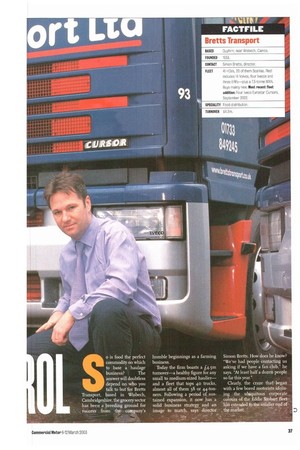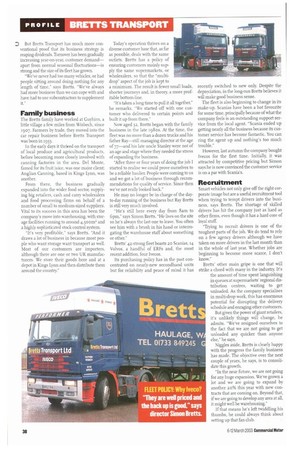o is food the perfect commodity on which to base
Page 37

Page 38

If you've noticed an error in this article please click here to report it so we can fix it.
a haulage business? The answer will doubtless depend on who you talk to but for Bretts Transport, based in Wisbech, Cambridgeshire, the grocery sector has been a breeding ground for success from the company's humble beginnings as a farming business.
Today the firm boasts a L4.5m turnover—a healthy figure for any small to medium-sized haulier— and a fleet that tops 40 trucks, almost all of them 38 or 44-tonners. Following a period of sustained expansion. it now has a solid business strategy and an image to match, says director Simon Bretts. How does he know? "We've had people contacting us asking if we have a fan club,he says. "At least half a dozen people so far this year."
Clearly, the craze that began with a few bored motorists idolising the uhiquitous corporate colours of the Eddie Stobart fleet has extended to the smaller end of the market.
But Bretts Transport has much more conventional proof that its business strategy is reaping dividends. Turnover has been gradually increasing year-on-year, customer demand— apart from normal seasonal fluctuations—is strong and the size of its fleet has grown.
"We've never had too many vehicles, or had people sitting around doing nothing for any length of time," says Bretts. -We've always had more business than we can cope with and have had to lIqP subcontractors to supplement it."
Family business
The Bretts family have worked at Guyhirn, a little village a few miles from Wisbech, since 1907. Farmers by trade, they moved into the car repair business before Bretts Transport was bom in i933.
In the early days it thrived on the transport of local produce and agricultural products, before becoming more closely involved with canning factories in the area. Del Monte, famed for its fruit juice, was one major client; Anglian Canning, based in Kings Lynn, was another.
From there, the business gradually expanded into the wider food sector, supplying big retailers, cash and carry wholesalers and food processing firms on behalf of a number of small to medium-sized suppliers. Vital to its success in this area has been the company's move into warehousing. with storage facilities running to around 4,500rn2 and a highly sophisticated stock control system.
"It's very profitable," says Bretts. "And it draws a lot of business in because most people who want storage want transport as well. Most of our customers are importers, although there are one or two UK manufacturers. We store their goods here and at a depot in Kings Lynn and then distribute them around the country." Today's operation thrives on a diverse customer base that, as far as possible, deals with the same outlets. Bretts has a policy of ensuring customers mainly supply the same supermarkets, or wholesalers, so that the "multidrop" aspect of the job is kept to a minimum. The result is fewer small loads, shorter journeys and, in theory, a more profitable bottom-line.
"It's taken a long time to pull it all together," he remarks. We started off with one customer who delivered to certain points and built it up from there."
Now aged 32. Bretts began with the family business in the late 1980s. At the time, the fleet was no more than a dozen trucks and his father Ray—still managing director at the age of'—and his late uncle Stanley were not of an age and stage where they needed the stress of expanding the business.
"After three or four years of doing the job I started to realise we could prove ourselves to be a reliable haulier. People were coming to us and we got a lot of business through recommendations for quality of service. Since then we've not really looked back."
He may no longer be in charge of the dayto-day running of the business but Ray Bretts is still very much involved.
"He's still here every day from Sam to Gpm." says Simon Bretts. "He lives on the site so he's always the last one to leave. You often see him with a brush in his hand or interrogating the warehouse staff about something or other."
Bretts' 42-strong fleet boasts 2o Scanias, 14 Volvos. a handful of ERFs and, the most recent addition, four lvecos.
Its purchasing policy has in the past concentrated on nearly-new secondhand units but for reliability and peace of mind it has recently switched to new only. Despite the depreciation, in the long-run Bretts believes it will make good business sense.
The fleet is also beginning to change in its make-up. Scanias have been a hot favourite for some time, principally because of what the company feels is an outstanding support service from the local agent. "Scania ended up getting nearly all the business because its customer service has become fantastic. You can ring the agent up and nothing's too much trouble."
However, last autumn the company bought Ivecos for the first time. Initially, it was attracted by competitive pricing but Simon says he is now convinced the customer service is on a par with Scania's.
Recruitment
Smart vehicles not only give off the right corporate image but are a useful recruitment tool when trying to tempt drivers into the business, says Bretts. The shortage of skilled drivers has hit the company just as hard as other firms, even though it has a hard core of loyal staff.
"Trying to recruit drivers is one of the toughest parts of the job. We do tend to rely on a few agency drivers although we have taken on more drivers in the last month than in the whole of last year. Whether jobs are beginning to become more scarce, I don't know."
Bretts' other main gripe is one that will strike a chord with many in the industry. It's the amount of time spent languishing in queues at supermarkets' regional distribution centres, waiting to get unloaded. As the company specialises in multi-drop work, this has enormous potential for disrupting the delivery schedule and enraging other customers.
But given the power of giant retailers, it's unlikely things will change, he admits. "We've resigned ourselves to the fact that we are not going to get unloaded any quicker than anyone else," he says.
Niggles aside, Bretts is clearly happy with the progress the family business has made. The objective over the next couple of years, he says, is to consolidate this growth.
"In the near future, we are not going for any huge expansion. We've grown a lot and we are going to expand by another 20% this year with new contracts that are coming on. Beyond that, if we are going to develop any area at all, it might well be warehousing."
If that means he's left twiddling his thumbs, he could always think about setting up that fan club.




































































































































































